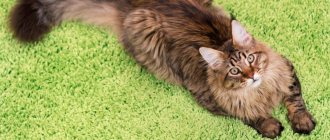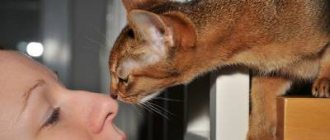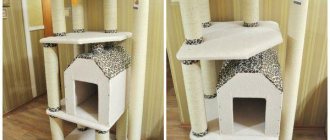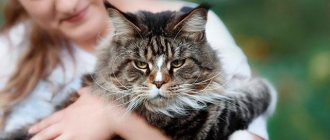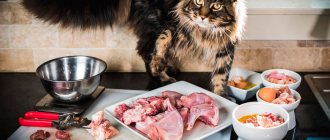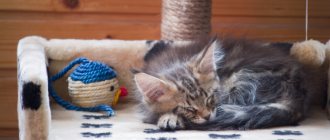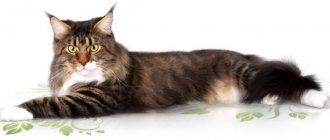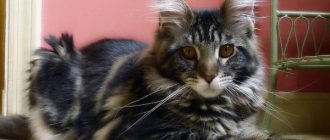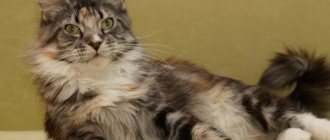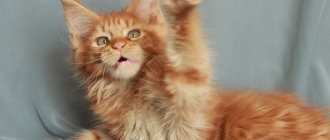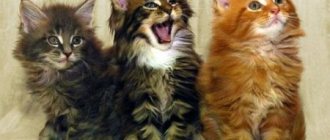Maine Coons are freedom-loving and independent animals, which is why many people believe that they cannot be trained. This is not entirely true - the standard process of education and training applied to dogs simply does not suit Maine Coons. These cats are smart, sociable and have a stable psyche, so all that is required from the owner is to find the right approach to raising a pet.
This is prohibited
It will not be possible to avoid absolutely all problems when raising a pet, since each Maine Coon is unique, and it is impossible to foresee everything in advance. It is important to know the basic principles of behavior in case of problems and adhere to them:
Read also: How to grow onions from a bulb
- The use of physical force is prohibited. You cannot hit a kitten with your hand or any other object; this will lead to the fact that it will not only grow up to be a fearful cat with an unstable psyche, but will also begin to see its owner as an enemy.
- You cannot punish for something that was done a long time ago. If the consequences of a pet’s prank were not detected immediately, then there is no point in scolding him a few hours later - he will not understand what caused the owner’s dissatisfaction.
- Praise more than punish. The kitten should be praised and encouraged even for the most insignificant successes, but scolded only for serious offenses.
It is important for Maine Coons to understand and feel that the owner is, first of all, a friend. In this case, cats try their best to please the owner.
Names for Maine Coons
Cats of this breed are the largest in the world - the owners of these giants are undoubtedly proud of their pets. But buying a kitten is not a problem, but giving it a worthy name will have to spend a lot of time. It is not at all necessary to name the cat right away - you can watch him, get acquainted with his habits and only then choose the best name for your ward.
Breeders are engaged in breeding Maine Coons - their kittens already have their own names. Of course, the new owners do not have to leave this name - they can easily choose something of their own. When choosing a name for your maine coon, you can follow several rules:
Who are Maine - Coon cats?!
Despite their wild appearance, Maine Coon cats are very affectionate and kind. They are loyal to their owner and wary of strangers.
The best thing that Maine (America) gave to the world is the American raccoon cat (Maine Coon). Due to their coat color, powerful build and huge tail, the animals look a little like raccoons.
Hence the name of this breed: Maine is the English name of the state, coon is the second part of the word racoon, which means “raccoon”. Maine Coons are the largest of the domestic cats and they get along well with dogs.
Raising a Maine Coon kitten
To make life with a pet pleasant and cloudless, you need to make efforts to raise a Maine Coon kitten.
Determine the rules for living in the house: where the cat can be, where it cannot be, because there are places that pose a danger to the pet.
If your Maine Coon kitten does something wrong, you can make a sharp noise. It is strictly forbidden to hit a Maine Coon kitten!
In principle, raising a Maine Coon kitten is not too difficult, because these cats are very affectionate and friendly, and train well. When raising a Maine Coon kitten, it is important to be patient and reward correct behavior in a timely manner.
Tricks
Cats are not dogs at all, but the Maine Coon breed can be trained to give a paw. To do this, you need to take the kitten’s paw several times a day, saying the command “Give me your paw.”
After completing a specific task, the pet must be rewarded with a treat. Using the same technique, you can teach a kitten to approach its owner.
If the owner gives the kitten medication, it is important not to reward it with treats afterwards.
You should not overwork your animal with long-term training, as this causes fatigue and irritation. If your pet has learned a trick, you don’t have to constantly ask him to repeat it.
Even if the animal already responds well to commands, you need to reward it every time. But if he comes up and does something on his own, trying to beg for a treat, the owner should reward him in a different way.
You can pet it. Otherwise, the animal will decide that it can perform tricks only when it wants to receive a reward.
If a Maine Coon kitten has learned a trick, don’t constantly ask him to repeat it/Yandex Collections
Common problems
The main problems that you may encounter when raising a Maine Coon and how to solve them:
- The cat goes to the toilet in the wrong place - sit the pet next to a puddle, sternly say “No!”, and then take him to the litter box.
- The Maine Coon climbs into places where it is forbidden, for example, on a table - spray water into it from a spray bottle. This action is unpleasant for the cat; it will serve as a kind of stop signal.
- The pet scratches the furniture, ruins the curtains with its claws - use a spray bottle, sternly say “No!”
Also often noted is the tendency of Maine Coons to chew on wires, which can be not only unpleasant, but also dangerous due to the risk of a short circuit. If it is impossible to hide the wiring, you should spray it with citrus juice - this smell is unpleasant for cats.
How to educate?
During the first days in a new place, the pet must learn to go to the litter box according to its needs.
A Maine Coon kitten is taught a culture of behavior from childhood, otherwise it will grow up to be a big, whimsical cat that brings trouble, with no idea what is possible and what is not. For comfortable coexistence between the pet and its residents, the coon is trained to use a litter tray from the day of relocation. So that the animal understands where to relieve itself, it is better to carry the pet in your arms the first time and wait until it copes with its business. A friendly bond is formed in the next 2-3 days, this time is the most important, it is worth paying all your attention to the pet. Physical pressure on maines is prohibited; the animal will be offended and perceive the owner as an enemy. Maine is a smart enough creature to understand cause-and-effect relationships; in punishments it is worth focusing on this trait and “teaching a lesson” immediately at the moment the dirty trick is discovered. After an hour or two, the action is meaningless, the pet will not understand and will continue to do the same thing, only with greater impact.
Return to contents
Training
The cat is prone to following commands, remembers basic and complex settings, and learns easily and with interest. Several prohibitions on a certain action will be stored in memory and there will be no repetition of the negative action. The main way to wean young coons from “bad manners” is to spray their faces with a spray bottle of warm water. This will solve the problem of climbing on the table and stealing food from plates. Furniture is protected from scratches by attaching a sticky material (for example, double-sided tape) or by spraying with an aerosol that has an unpleasant odor for animals and a neutral odor for humans.
Training a Maine Coon at home is a responsible undertaking. You need to be patient and persevering.
The animal very quickly learns to give its paw to a person.
The command “give me your paw” is easily mastered by a cat, using encouragement as the main method of education. They carefully raise Maine's paw and pronounce the name of the trick. The second or third time, when you bring your open palm to the animal, it will offer its paw on its own. If successful, treat the student with a treat and repeat the procedure to consolidate the result. It is important that the pet must feel interested and take the initiative; you should not forcefully train it, it leads to the opposite consequences. Based on this base, the pet is taught any tricks.
Return to contents
Promotion
How to raise a Maine Coon to be an affectionate pet? Be sure to reward your pet for good behavior. It is important for Maine Coons to hear that they are praising them and to understand that they are happy with them. Cats love affection very much, they try to earn it, so they will try to behave well. When you teach your cat commands, you can use treats as a reward.
How to choose a Maine Coon kitten?
The demand for Maine Coon kittens is quite high, and you can see many advertisements for the sale of babies. But, unfortunately, not all sellers are conscientious and responsible breeders, which means there is a high risk of buying a not very healthy kitten or mixed breed. How to choose a Maine Coon kitten so as not to regret it later?
Before you go to choose a Maine Coon kitten, study as much information as possible about the breed, visit exhibitions, talk with breeders and existing owners. This way you will understand whether this breed is right for you, and you will be more likely to determine whether a purebred kitten is being offered to you.
Rules for choosing a Maine Coon kitten:
- Check out the breed standard.
- Don’t buy a kitten from the first ad you come across, even if the price is attractive. Contact an experienced breeder with a proven reputation.
- If the breeder does not agree for you to visit the nursery and meet the kitten’s parents, this is a reason to think about whether you should trust such a seller.
- Pay attention to whether the Maine Coon kitten has signs indicating that it belongs to this breed: a long tail, tassels on the ears, a characteristic shape of the muzzle.
- Be sure to conclude a purchase and sale agreement with the breeder.
- Answer the breeder's questions honestly - this will give him the opportunity to help you choose the Maine Coon kitten that is right for you. And don’t hesitate to ask questions yourself.
- Check to see if the nursery is registered in the felinological system, and if the answer is positive, find out which one.
- Pay attention to the kitten’s appearance, activity, grooming, and playfulness. These are important indicators of health.
- It is better to choose a Maine Coon kitten that is 3 - 3.5 months old. At this age, the kitten already has the necessary vaccinations, has been fed mother's milk for quite a long time and is adapted to the world around it. At the same time, the baby is already ready to part with his mother, sisters and brothers.
In the photo: Maine Coon kitten.
Photo: flickr.com
Combating aggressive behavior
Despite their balanced behavior and calm nature, Maine Coons can be aggressive.
This condition is considered normal in the following cases:
- the animal is tired or unwell, or sick;
- fright, a state of fear or shock;
- irritation from external factors;
- fight with other cats;
- strong passion for gaming;
- excited state.
Cats of this breed can bite and scratch both with positive and negative emotions. A sick animal should be left alone and allowed to lie down in a secluded place. If a kitten gets too playful and injures its owner, you can press it to the floor for a few seconds and ignore it for half an hour after the punishment.
This method will not cause pain to the pet, but will make you understand that doing so is bad. To avoid such situations in the future, it is better to use special toys for play. Do not expose your arms, legs or other parts of your body.
Throws on the owner
Signs of aggressive behavior in cats include hissing and lunging at people. This is how the animal prepares for self-defense when it feels threatened or in danger. If a representative of this breed perceives the owner as an enemy and is very irritated, you should leave him alone and give him time to calm down. And you will have the opportunity to analyze the situation and understand what provoked such a reaction.
Causing injury
An individual of any age can injure or injure a person. Cats bite when their teeth change or during puberty. To avoid injury, you should purchase special toys for your pet at the pet store that can be chewed.
And also watch your diet. An unbalanced diet has a negative impact on health and behavior.
Problems arise when cats bite and scratch their owners in a fit of aggression. This behavior must be stopped immediately. Otherwise, it will be difficult to defend the position of leader in communicating with this breed. You can punish by splashing water in the face or shaking the withers. Then a short period of ignoring and reconciliation.
Incessant meowing
Meowing is a way to attract attention. Most often, cats communicate in this way about hunger or thirst. But it is possible that the animal is feeling unwell or requires affection. When a kitten meows for a long time and persistently, it means he needs the owner’s participation. The main task is to identify his needs and help.
Appeal word
In order for your pet to understand that you are calling him, be sure to pat your hand on the place where your pet should be. For example, on an armchair or sofa.
“Come to me” or “come here” should cause the correct reaction, namely the pet’s approach to the right place.
You can call a cat to give him food, pet him or communicate, but not to give him a tasteless medicine or punish him.
Give your pet as much attention as possible, talk to him, educate him. Then your communication will bring you only pleasure.
How to wean yourself from damaging furniture
Cats of any breed, and Maine Coons in particular, need to have their claws sharpened. To avoid damaged furniture and torn wallpaper, you should buy a special scratching post and teach the kitten to use it. This will take some time, but it should be done with small kittens. It is difficult to retrain an adult cat.
There are owners who resort to extreme measures and remove the claws of their pets. This is a brutal and painful procedure. It can be compared to the amputation of a human limb. Choose a kitten from nurseries where they are trained to use a litter box and scratching posts before being sold. All that remains is to adapt it to the new conditions in your apartment.
From the first days a Maine Coon kitten appears in your home, you can establish friendly contact with it and competently carry out the process of education and adaptation. As a result, you will get an affectionate and devoted pet.
Recommendations for education
To teach a cat something well, you need to start training the kitten early. Adult cats are already individuals who have difficulty learning new things.
The breed is willful, so any orders will be ignored. All new skills should be spoken in a soft and calm tone.
Training should not exceed 20 minutes per day. To consolidate the result, you need to give your pet a treat.
If the pet reacts negatively, then it is better not to continue the training. If the entire training takes place in a game format, this will increase efficiency many times over.
What not to do
Some actions should never be allowed, namely:
- Leaving a kitten alone with open windows may cause injury or escape;
- Scolding for actions, after a significant amount of time has passed, the pet simply will not understand why they are scolding him;
- Leave cords on the floor; your pet may chew them;
- Leave household chemicals within easy reach;
- Yelling at an animal; loud noises cause fear in a pet;
- Cause pain to the kitten.
Cats are headstrong animals; if you beat them, they will not forgive it.
Punishment word
A similar word could be “fu”. When your pet learns to understand the meaning of this word, you will not have to resort to other methods of disapproval. This word must be pronounced in a loud, unpleasant voice, looking the pet straight into the eyes.
Touch his nose with your finger. This gesture is considered to be an educational gesture by a mother cat.
If these measures do not help, you can pinch the cat by the ear or lightly spank it with a newspaper, but under no circumstances not with your hand. The punishment word should be unpleasant. It is important to remember that the pet must understand why he is being punished, then he accepts and understands it.
Temperament and aggressive behavior
The type of Maine Coon's temperament determines exactly how it will react to external stimuli. Among the representatives of this breed, sanguine and phlegmatic people are most often found. Both types have no problems with adaptation; they easily get used to new places and people. Inexperienced breeders find it a little more difficult to deal with choleric cats due to their hyperactivity and frequent mood swings.
A kitten is born with a certain temperament, which cannot be changed, but any cat can be trained to behave correctly.
Aggressive behavior can occur in the following situations:
Training and communication
Maine Coons are freedom-loving and independent, so you should not expect unquestioning obedience from them. However, this breed can be taught some commands and, more importantly, proper behavior around the house. First of all, it is necessary for the pet to remember its name and associate it with something pleasant, after which more intensive training should begin.
The most suitable way for Maine Coons to learn and consolidate skills is through play.
You need to take a closer look at your pet and understand what he likes - every cat has favorite activities and individual inclinations.
It is with the development of these talents and inclinations that it is worth starting, consolidating successes with affection and delicacies. One of the characteristics of Maine Coons is hunting for various objects. They love to carry toys in their teeth and often bring them to their owner’s feet, hinting at a desire to play. This trait can be developed and your pet can be taught to fetch thrown objects on command.
Another common command for training Maine Coons is to give the paw. To do this, you first need to carefully lift the paw of a sitting cat, making sure to accompany your actions with the command “Give me your paw” and treating the animal with a treat. Then you should extend your palm, repeat the command and reward the pet if it is completed. If the cat does not respond to the command, the training should be repeated from the beginning, gradually strengthening the skill.
Features of care
One of the disadvantages of this breed is the maintenance of their coat. Maine Coons must be brushed for 10-15 minutes a day to prevent tangles from forming. Particular attention is paid to the tail. They need to be combed carefully and carefully.
Another mandatory part of Maine Coon care is washing. For these cats, bathing is pure pleasure. Also, their owner should purchase a special nail clipper, because their claws grow very quickly and they do not always have time to sharpen them off on their own. Also, clean your eyes and ears as needed.
You need to take a responsible approach to compiling their diet. Maine Coons will not eat cheap popular foods. Their menu must include natural meat; sometimes seafood can be provided. But not raw fish, especially if the cat is neutered. Milk can be given to kittens up to three months. If you are going to buy dry and wet food, then they should only be premium.
Compliance with all recommendations for the care, nutrition, and education of a Maine Coon kitten depends on its condition and attitude towards its owner. These are peace-loving cats that get along well with children and easily adapt to new conditions. Their owners have no difficulty raising them. And thanks to their high level of intelligence, these cats can be taught simple commands. The main thing is to approach the training process with patience and love, then the Maine Coon will be affectionate with people.
What should I do to wean myself off?
An animal will not do this if it has something to play with. To wean your coon from biting, maintaining the following rules will help:
- Do not use body parts in games.
- Provide the animal with a sufficient number of toys.
- Punish for biting and scratching.
- Allow dynamic entertainment.
- Adopt a kitten from a breeder from 12 weeks of age;
- Provide a balanced diet.
Raising a cat
An experienced cat breeder carefully selects the animal, taking an interest in its ancestors and habitat.
An adult cat is capable of making his own rules. Often this only happens at the beginning. With a neutered Maine Coon or kitten, such nuances are excluded. If a coon attacks, you need to punish him: lightly hit him, shake him by the withers, or press him to the floor. It's important not to overdo it. After this, aggressive pets are not given attention for 30 minutes. Biting games are ignored. If there is excessive activity and there are no contraindications, the veterinarian offers a mild sedative so that the adult uncastrated cat does not bite the newly arrived kitten. Therefore, before adaptation, it is important to pay due attention to cats. If you suppress impulses of aggression and gradually accustom cats, the Maine Coon will not be able to bite the baby.
How to structure Maine Coon training sessions
Professional circus performers adhere to two rules for organizing classes with Maine Coons:
- The best time for “lessons” is in the morning. It has been noticed that at this time Maine Coons and some other breeds of cats show their best side and are not distracted by matters that interfere with training.
- Professionals try to play more with the Maine Coon - in joint entertainment, the animal shows what tricks it likes to perform.
Playing with and training a Maine Coon must take place in an environment that is comfortable for the cat.
Aggression in kittens
An affectionate and gentle creature eventually turns into a restless teenager. Small animals learn about the world by testing things out. During the first month, a Maine Coon grows up with its mother and brothers and sisters. They play, biting each other, catching the tail, and the cat teaches them how to hunt and how to stand up for themselves.
When a change of teeth occurs, the owner is guaranteed to have damaged things and barely noticeable wounds. You can teach him to chew special toys, give him small natural sinews, and treats. Then the kitten switches attention, and the process of education begins.
Most often, children's feet suffer from playing. Not everyone goes through this when they grow up, because character and temperament are passed on from their parents. Hyperactivity is a sign of good health and proper development. The kitten learns to interact, tries different forms of communication. He repeats the pattern of behavior in the pride, attacks from secluded places, supposedly tracking down prey.
Tray and scratching post training
Maine Coon kittens are trained to use a litter tray and scratching post from a very early age. They, like other representatives of the cat family, can go to the wrong place. Or sharpen your claws on furniture. The tray should be placed in a secluded place, and you need to keep it clean.
At the age of four months they begin to accustom them to a scratching post. Using your example, show how to use it: imitate the movements of the claws with your fingers. As soon as you see that the kitten begins to damage the furniture, bring it to a specially equipped place. Both the tray and the scratching post should be selected according to the size of the pet.
Education at home
Maine Coons are not unteachable animals, but in order for a small kitten to grow up to be an obedient pet, it needs to be raised from an early age. The breeders in the nursery are also involved in training the litter box and scratching post, where the kitten begins to socialize. After the Maine Coon moves to a new home, the owner needs to clearly define the boundaries of what is permitted for the pet and patiently explain to him the rules of behavior.
What is allowed to a kitten will also be allowed to an adult animal: it is almost impossible to wean an adult Maine Coon from anything.
The easiest way to find a common language with your pet is to use the method of prohibitions and rewards. With correct behavior on the part of the owner, raising a Maine Coon becomes not a routine, but an exciting activity.
